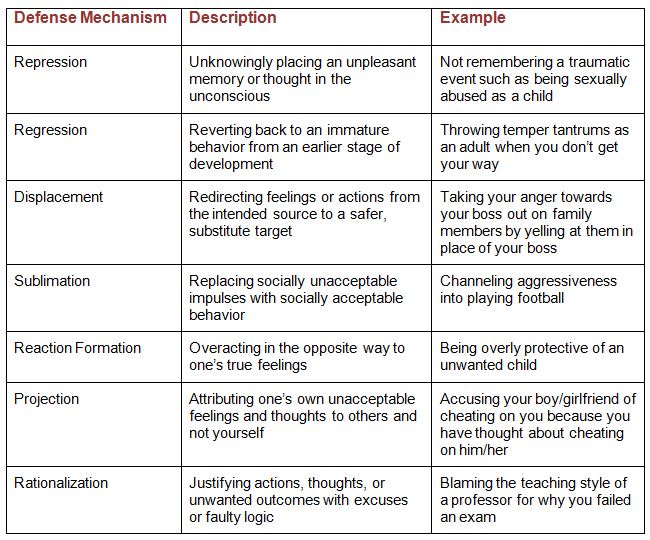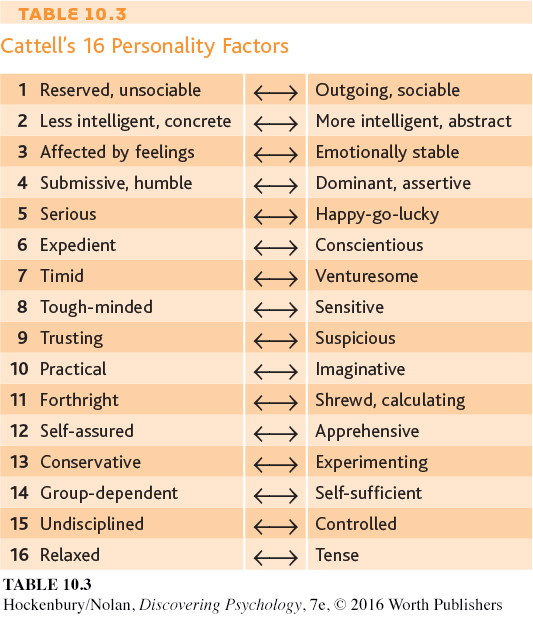PSYCH 105, 12 Personality and Behaviour Perspectives
Personality and Behaviour Perspectives
PT 1 - Personality
What is Personality?
Personality - an enduring set of internally based characteristics that create uniqueness and consistency in a person’s thoughts and behaviours
Personality Trait: internally based characteristic that make up one’s personality
durable disposition to behave in a particular way in a variety of situations
Three Distinct Elements
Uniqueness - personality traits are specific to each person
Consistency - Looking at an individuals behaviour across time in similar situations, looking at patterns
Personality provides an explanation to account for the expression of the behaviour
The Psychodynamic Perspective
Psychodynamic theorists look for the causes of behaviour in a dynamic interplay of inner forces that conflict with one another
Freud’s Psychoanalytic Theory
Focused on:
early childhood experiences
unconscious conflicts
Sexual and aggressive urges - internal forces
Powerful influence on behaviour
Physical symptoms appear without a physical cause - conversion hysteria
Important Concepts
Psychic Energy
Internal forces generated by instinctual drives
Discharged directly (acting on urges) or indirectly (vent energy in an unrelated way)
Mental Events
Conscious - things we are aware of
Preconscious - things we are not aware of but can be easily recalled
Unconscious - things we are not aware of
The Structure of Personality
Like an iceberg
Conscious stuff is at the top - stuff we can easily recall and remember, stuff we are aware of (Super-Ego)
Pre-Conscious stuff is in the middle - not currently being thought about, but easy enough to get to (Ego)
Unconscious stuff is at the bottom - unavailable to awareness (infantile memories, repressed wishes and conflicts) (Id)
The Id
Exists within the unconscious mind
Develops first
The innermost core of the personality
The source of all psychic energy
The only structure present at birth
No direct contact with reality, and functions in a totally irrational manner
Controlled by the Pleasure Principle
Seeks immediate gratification or release
Regardless of rational considerations and environmental realities
“Want…take!”
The Ego
Functions at a primarily at a conscious level
Develops second
Functions to keep impulses of id in control
Decision making component
delays gratification
Imparts self control
Operates according to the Reality Principle
Tests reality to decide when (and under what conditions) the id can safely discharge its impulses and satisfy its needs
Secondary Process Thinking - How can we maximize gratifications without the negative consequences of acting against society’s expectations
Neurotic Anxiety - when the ego is threatened by unacceptable and potentially overwhelming impulses from the ID
The Super Ego
The last personality structure to develop
The moral aspect of personality
Controls the impulses of id with external control
Develops by the age of four or five
Repository for the ideals and values of society
Conflict, Anxiety, and Defence
Ego can’t always control id = conflict
Anxiety when impulses of id threaten to get out of control
Defence Mechanisms
Weapon of Ego
Are distortions of reality
Operate unconsciously
Cause of maladaptive behaviour

Stages of Psychosexual Development
Series of Stages
Focuses on specific pleasure sensitive areas of the body
Adult personality is a function of progressing through these stages
Fixation
Arrested development where instincts focused on particular area
Evaluation of Psychoanalytic Theory
Difficult to test
Result genuine or result “defence mechanism”?
Unconscious processes
Non conscious processes have been developed
Psychosexual stages
Concept of childhood sexuality rejected
Issue = importance of early experiences and emotional attachment
Neo Freudian Perspectives - After Freud
Jung’s Analytical Perspective
Personal Unconsciousness: Freud’s idea of Unconsciousness, except Jung named it differently
Collective Unconsciousness: unconscious store of the experiences of past generations of different people throughout the world
Ancestral knowledge, aka archetypes
Evidence: universal knowledge; tendencies that people share; archetypes
Archetypes: Universal thought patterns, images and behaviour rituals triggered by specific situations, symbols and images representing certain people, ideas, or beliefs
Adler’s Individual Perspective
Striving for Superiority
Universal to drive, to adapt, improve oneself, and master life’s challenges
Feelings of inferiority push us to be our better selves
Inferiority complex - when feelings of inferiority are extreme
Compensation: efforts to overcome imagines or real inferiorities by developing your abilities
Overcompensation to hide inferiority complex
Birth order and Personality?
Home environment for first born children very different than second born - have different predispositions
Different environment and treatment can effect personality
Horney’s Interpersonal Perspective
Social Security - sense of feeling safe and loved in relationship with others
The motivational force that is underlying the expression of personality
Basic Anxiety - feelings of anxiety due to lack of love, power, and safety in a relationship
Basic hostility - feelings of anger and hostility people experience during insecurity
Strategies to seek social security
Moving toward people - trying to obtain affection and protection from others
Moving against people - Aggressive behaviour to obtain power over others
Moving away from people - social and emotional withdrawal from others
Pros and Cons of Neo-Freudian Perspective
Strengths
Jung expanded emphasis on influence of the importance of the conscious and unconscious
Adler and Horney expanded emphasis on importance of social relationship in the expression of personality
Limitations
These are vague concepts that are difficult to measure
Perspectives are based on biased samples of clinical observations
PT 2 - Behavioural Perspectives
Behaviourism
Only overt (external) behaviour is worth studying
Focus on external forces, interactions with external environment
Learning from experience
Skinner and Personality
Operant conditioning: form of learning where likelihood of behaviour is determined by the consequences of engaging in that behaviour
when a child is learning to speak; getting praised for saying a word right and getting “consequenced” for saying a word wrong
An individual’s personality is a collection of response tendencies that are tied to various environmental stimuli
Party example from slides
What does this theory of operant conditioning tell us about personality?
Personality is continuing to develop and change as we gain experience
Can be explained externally
How is this different from other perspectives?
No focus on internal and unconscious processes
Not broken down developmentally
Bandura’s Social Cognitive Theory
Famous for research on modelling and aggression (Bobo the Clown study)
Adults acts aggressively with the dolls. If a child sees the adult being scolded for being aggressive, are they more likely to be less aggressive when they are older?
Idea of learning from other people’s actions
Cognitive behaviourist movement in 1960s
Issue with “pure” behaviourism
Humans are thinking, feeling, conscious
Also largely shaped by learning
Originally Social Learning Theory
How does this theory compare to Skinner’s?
Bandura argues that in learning, people are not passive participants
Actively seek out information from the environment
Environment influences behaviour, but does not determine it
Reciprocal Determinism - determining effects, active participant in learning
Focus on information processing in terms of internal evaluations. Unobservable cognitive events can still be important in understanding why we engage in certain behaviours
Reciprocal Determinism: internal mental events, external environments, and overt behaviour all influence each other
Observational Learning: observing someone else’s behaviour and learning from the consequences of their actions
AKA Vicarious Conditioning
The model is an organism who’s behaviour is observed
Self-efficacy: belief about your ability to do some kind of behaviour, which then leads to an expected outcome
High self efficacy - confident in your ability to execute the responses necessary to get what you want
Low self efficacy - concern that necessary responses are beyond your abilities
Determinations are subjective and specific
What influences Self-Efficacy
Performance experiences
Observational Learning
Verbul Persuasion
Emotional Arousal
The Person - Situation Controversy
Focus on how much situational factors govern behaviour - Mischel
People make responses that lead to reinforcement in the situation at hand
Consistency Paradox - consistency in the behaviour of an individual is low
You will work hard if your boss gives compensation
People don’t behave as consistently as predicted
Sparked debate about importance of considering the person (what is learned) vs situation they are in (what they have learned)
Mischel wanted to get more specific than Skinner was, thought Skinner was too broad
Rotter’s Locus of Control
Locus of Control: how much a person receives an outcome as being contingent on their own actions rather than on external forces
How much someone has control over a situation
Internal: events under personal control
Self determination, sense of personal effectiveness
They feel like they can make a genuine difference
External: external forces like luck, chance, powerful others
Less resistant to social powers
Rogers’ Person Centered Theory
Threat: occurs when experience is inconsistent with self concept
Leads to anxiety
Need for positive regard: innate need for love, acceptance, and sympathy
Unconditional Positive Regard: Independent of behaviour
Conditional Positive Regard: Dependent on behaviour
Positive self regard: experience of being unnderstood and valued gives us freedom to grow
Evaluating Behavioural Perspectives
What about cognition? Eventually considered
Advanced our understanding of both internal and external factors
Skinner stressed role of environment
Bandura stressed importance of learning from other
Mischel stressed importance of situational factors
Puts insights from other perspectives into cognitive behavioural concepts
Biological Perspectives
Factor Analysis - Statistical Approach where the goal is to find correlations among measured variables
Five Factor Model

Eyesneck’s Theory
Personality is structured from a hierarchy of traits
Three higher-order trait continua
Extraversion → Introversion
Neuroticism → Stability
Psychoticism → Self Control
Cattel’s 16 Factors

5 Factor is good for broad aspect of things, Cattel’s is good for more specifity
Behavioural Genetics Perspective
Twin studies: determining whether a characterstic is due to genetics (nature) or upbringing (nurture)
Concordance rate: the degree to which a characterisitc, trait, or disease in one twin will occur in the other twin